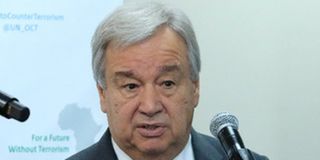UN boss reiterates need for women in leadership

UN Secretary General Antonio Guterres addressing the media at the UN Complex in Gigiri in 2019.He has reiterated the need for having women in leadership to create an equal future in a Covid-19 world.
What you need to know:
- UN Secretary General António Guterres has reiterated the need for having women in leadership to create an equal future in a Covid-19 world.
- Feminists across the globe are keenly observing Mr Guterres on his commitment to promoting the gender equality agenda.
United Nations (UN) Secretary General António Guterres has reiterated the need for having women in leadership to create an equal future in a Covid-19 world.
"As we look to recover from this crisis, women’s leadership will be vital to build a better world," he tweeted on Sunday while referring to his February 27, 2020 call for gender equality.
At the New School in New York, Mr Guterres had said "Only through the equal participation of women can we benefit from the intelligence, experience and insights of all humanity."
His reinforcement comes at time women across the globe, are preparing to celebrate the International Women's Day themed Women in leadership: Achieving an equal future in a Covid-19 world.
Women have been in the forefront striving to end the pandemic either as healthcare workers, scientists doing research or caregivers.
On the other hand, they suffered heavily from loss of jobs, collapse of informal businesses, unpaid labour and gender based violence (GBV), which gender equality advocates hope can be reversed through economic recovery and social interventions sensitive to needs of women.
Promoting gender equality
Feminists across the globe are keenly observing Mr Guterres who is serving his fifth year in the first-term appointment, on his commitment to promoting the gender equality agenda.
A review of his performance for 2020 by International Centre for Research on Women (ICRW) on behalf of Feminist UN Campaign, a group of feminists from academia and civil society, indicated his poor performance in financing for gender equality despite related initiatives and actors remaining vastly underfunded.
He also lagged in enabling a feminist transformation for Commission on the Status of Women and UN Women into stronger, more inclusive bodies and resources within the wider UN system.
In his final year, the feminists demand of him" to demonstrate his clear commitment to strengthening the UN’s gender equality architecture, from UN Women, to gender advisors to the Commission on the Status of Women — and to civil society’s meaningful engagement in its efforts."





